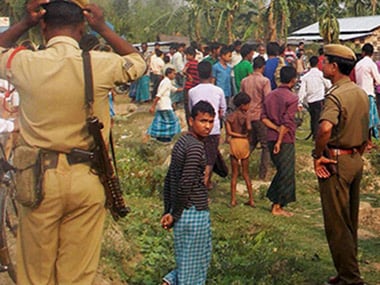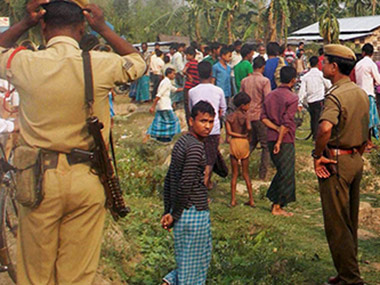If, in an already highly polarised election season, the deaths of 32 people in Assam’s Baksa and Kokrajhar districts to attacks by heavily armed Bodo militants were met by political parties indulging immediately in finger-pointing, it is because the Lok Sabha Elections have seen the Bodoland issue once again occupy centre-stage in the state. The Bharatiya Janata Party has promised the All Bodo Students’ Union that it will “re-examine” the demand for a separate state of Bodoland. Chief Minister Tarun Gogoi has repeatedly ruled out the possibility of a separate state, preferring to declare that the government will protect the interests of the minorities in the region. [caption id=“attachment_1506775” align=“alignleft” width=“380”]  The scene after the militant attacks. PTI[/caption] The Bodoland People’s Front (BPF) is a Congress ally in the state government and has deftly placed itself on the fence for the present, supporting the UPA government’s move to set up an expert team to study the feasibility of a separate state. So, it was not surprising at all that the BJP’s Ravi Shankar Prasad blamed the “votebank politics” of the Centre and the Congress-led state government. The attacks in Assam, in the same region where 2012 saw possibly India’s worst case of mass human displacement owing to conflict, is only the next phase of violence in a bitter cocktail of ethnic issues and competition for resources that have troubled this region. Here are five things you need to know about the Bodo-Muslim conflict in Assam. 1. There is a history that provides context to the continuing violence. The districts of Kokrajhar, Baksa, Chirang and Udalguri (the latter three were recently created districts) are home to Bodos but also to Muslims, OBCs and other groups. In fact, much of the violence is centred around the perceived rapid growth of the Muslim population in the region. While Scheduled Tribes (mainly Bodos) constitute about a third of the population in these four districts, the STs have actually become a minority in the region, contributing to deep insecurities among the ethnic Bodos with regard to the Muslims. The history is that the Bodos, Assam’s biggest tribal group, have had bitter clashes with other Adivasis and the Muslim “settlers” (called thus because parts of Assam have seen years of migration from Bangladesh right since the 1950s). The 1990s saw an active insurgency and a Bodo movement, a simultaneous sense of persecution among the non-Bodos who continued to get pushed to the fringe of politics in Kokrajhar and the region surrounding it. 2. A peace accord was signed, but issues remain unresolved After years of militancy and one failed peace accord, the Assam government and the Centre (then led by the NDA) signed a second peace accord with the Bodo Liberation Tigers in 2003. This cleared the decks for the formation of the BTAD, the Bodoland Territorial Autonomous Districts, comprising Kokrajhar, Baksa, Chirang and Udalguri. The BTAD is governed, according to that accord, by the Bodoland Territorial Council (BTC), a sort of semi-autonomous body akin to some other tribal autonomous bodies in the state. Signing the accord were the surrendered insurgents of the Bodo Liberation Tigers (BLT) led by Hagrama Mohilary who went on to form the Bodo People’s Front (BPF) which has been in power in the BTC. The Congress party is not really present in the BTC, except through the BPF. The BTC accord gave political power to a Scheduled Tribe group that was historically disadvantaged in that region. But it posited them against another group, the Muslims, also historically disadvantaged in the state and in the rest of the country. And, while the Bodos obtained political power through the autonomy granted by a peace accord, it’s the Muslims who were perceived as having another kind of power, an opportunity to invoke some brand of majoritarian politics that could weaken the Bodos’ political autonomy. The BJP’s allegations of the attacks being a political game hinge on the fact that this large Muslim population has emerged as a political vote-bank with greater power than the political power granted to the Bodos. It doesn’t help that the non-Bodos, especially Muslims, are believed to resent the autonomy and the BTC as being sops for a group that is now a minority. 3. Illegal immigration remains a grey area The 2012 violence was variously described as having begun over the Bodos’ destruction of a mosque or an under-construction mosque in Kokrajhar or as having begun after the killing of some BLT men by Muslims. Either way, public perception was largely that the skewed demographics of Assam, owing mainly to the continuing illegal immigration from Bangladesh – the Bengali-speaking “settlers” are also called “Bangladeshis” – were at the root of the ethnic violence. The immigration issue is an important factor, with Bodos believing that the Muslim settlers support illegal immigrants who continue to arrive through the riverine areas. There have also been reports of rampant encroachment of state-owned forest land by Muslim encroachers. The Muslims live partly on forest land. They are now fleeing their homes, say reports. “Despite the government’s efforts to stop people from fleeing out of fear, 25 Bodo families fled to Kokrajhar from Fakiragram in Muslim-dominated Dhubri district. Bengali Muslims, too, were seen heading towards Dhubri district carrying their belongings,” said the report. 4. Prevalence of arms adds a lethal ingredient to a deadly cocktail of ethnic strife and political scare mongering. This report in The Hindu details the violence that occurred in BTAD over the past three days. “There were about 40 of them, some in battle fatigues and faces covered with black cloth, and some others wearing khaki. All of them held weapons,” says a survivor. The political control of BTAD by former Bodo insurgents has meant that the prevalance of arms in the region continues. Reports have said more than 100 illegal weapons have been seized in BTAD in the run-up to elections. Since January this year, 42 militants of of the National Democratic Front of Bodoland (Songbijit faction) have laid down arms, while 18 others have been killed in encounters. This easy presence of arms, coupled with the Muslims’ belief that the Bodos will rely on violence to drive Muslims out of the region, adds to the fear factor. The 2012 violence saw reports of crop damage and looting and arson too. 5. The Bodo leadership is itself fractured. The factions of the banned National Democratic Front of Bodoland barely see eye to eye. The anti-talks faction, the National Democratic Front of Bodoland (Songbijit), has denied its role in the attacks and has said it was “a political conspiracy by Assam government to trigger clashes between two communities”. A press statement by NDFB Secretary (Information and Publicity Wing) NE Esara said, “We ask the Assam government and its officials to stay away from such accusation without the slightest justification.” The pro-talks faction has recently demanded that the National Register of Citizens in Assam be updated, alleging that 70 lakh to 80 lakh foreigners came illegally into Assam between 1951 and 1971. It has regularly criticised violence by the anti-talks group, citing reports of extortion, kidnapping and killing of innocent people connected to that faction.
At the root of the ethnic conflict is a history of violence, political opportunism and the continuing presence of arms in a region where a peace accord did not resolve core issues.
Advertisement
End of Article


)

)
)
)
)
)
)
)
)



